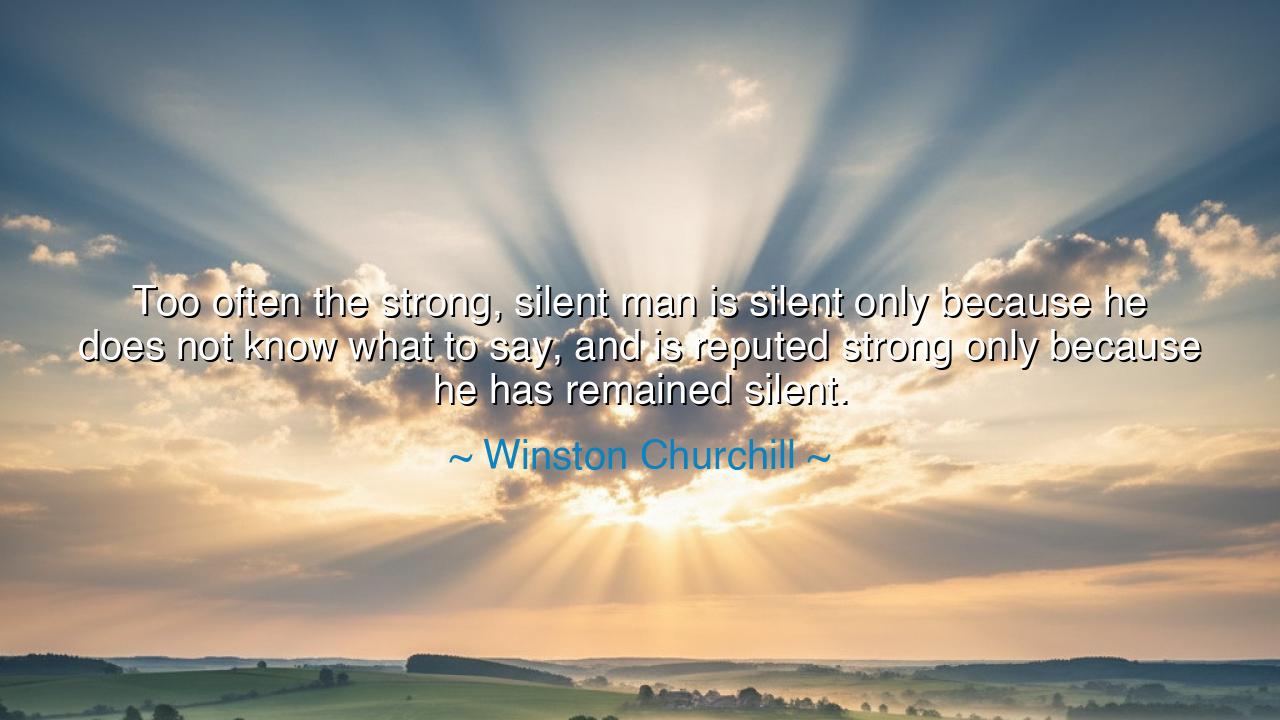
Too often the strong, silent man is silent only because he does
Too often the strong, silent man is silent only because he does not know what to say, and is reputed strong only because he has remained silent.






“Too often the strong, silent man is silent only because he does not know what to say, and is reputed strong only because he has remained silent.” So declared Winston Churchill, whose words burn with the clarity of a man who wielded speech as a weapon sharper than any sword. In this saying, he unveils a truth that the ancients themselves would have known well: that silence is not always a sign of strength, and that strength is not proven by stillness alone. To confuse the absence of speech with wisdom is to mistake the shadow for the substance.
The world has often praised the figure of the strong, silent man—the one who sits apart, whose words are few, whose mystery gives him an air of power. Yet Churchill reminds us that sometimes this silence is but emptiness, not depth. True strength is not in the refusal to speak, but in the courage to speak rightly when words are needed. For silence, when born of wisdom, is noble; but silence, when born of ignorance or fear, is a mask that deceives others and imprisons the self.
The ancients knew the danger of mistaking silence for strength. Consider the trial of Socrates, where many remained silent as injustice triumphed. Their silence was not wisdom, but cowardice. Socrates himself, though given the chance to hold his tongue and save his life, chose instead to speak, to defend truth even at the cost of death. His strength lay not in silence, but in words that still echo through the centuries. Here, we see the contrast: the false strength of those who hid in silence, and the true strength of one who dared to speak.
Churchill himself was a living example of this principle. In the dark days of the Second World War, many counseled appeasement, many chose silence in the face of tyranny, fearing to provoke a stronger foe. But Churchill raised his voice. His words—“We shall fight on the beaches… we shall never surrender”—were not the speech of a man content with being “strong and silent.” They were the defiance of a man who knew that to remain silent would be to betray his people. His greatness was not in his silence, but in his voice that gave courage to millions.
O children of tomorrow, learn this: silence is not always golden. At times, it is rust that corrodes the soul. There are moments when silence preserves peace and dignity, but there are also moments when silence allows falsehood to triumph and injustice to grow. Do not mistake the one for the other. The strong man is not the one who merely holds his tongue, but the one who knows when to speak and dares to speak truth, even if his voice trembles.
The lesson is plain: cultivate not the mask of the silent man, but the wisdom of the speaking man. Let your silence be purposeful, born of thought, not of emptiness. And when the hour comes, let your words carry weight, forged from conviction, not from vanity. For strength is not the absence of words, but the presence of truth within them.
Practically, let each person do this: when tempted to remain silent, ask yourself—“Am I silent because it is wise, or because I am afraid?” If the silence is cowardice, break it. If the silence is ignorance, learn, and then speak. Practice clarity in your words, and do not waste them—but never shrink from speech when speech is needed. In this way, you will be strong not in appearance, but in reality.
So remember Churchill’s wisdom: the strong, silent man is not always strong, nor wise. Strength is not in hiding, but in the courage to speak when the world demands it. Silence may win a reputation, but only words of truth and conviction can change the course of history.






AAdministratorAdministrator
Welcome, honored guests. Please leave a comment, we will respond soon